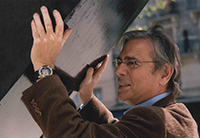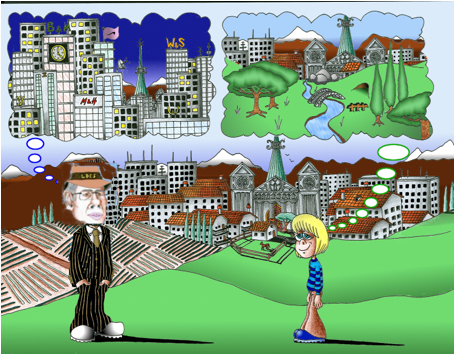
|
Environmental Education and
Sustainable Development Education
André Giordan

The first activities of André Giordan on Environmental Education (EE) take place in 1969; they cover the approach of a green space in urban areas in Nice. In 1971, he created a science club in Villeneuve la Garenne (suburb of Paris) with many work focuses on the impact of pollution and waste recycling. Upon his appointment at the Lycée Carnot in Paris, he created a new club on science and the environment.
As a young researcher at the National Institute in Education Rechearches, André Giordan represents France in the first Conference on the environmental Education organized by UNESCO and UNEP (1975) in Belgrade, at the request of the French authorities (Ministry of Environment, Ministry of Education). At that time, no one is interested in this issue in the French ministry !.
Then the UNESCO team invited him to collaborate in their thinking and production of the first educational materials. Subsequently, it was UNESCO consultant to prepare the Intergovernmental Conference in Tbilisi (1977). He writes "in negro" the book on the EE in the light of the Tbilisi Conference (UNESCO 1978) and co-write most of the preparatory teaching documents of the Helsinki Conference (1976) and Moscow (1987).
In the same time, André Giordan coordinate a first team of research and innovation on Environmental Education. This first innovation, involving twenty schools (urban, suburban, rural) and over fifty teachers (in all disciplines), continued until 1980. This research was chosen as a pilot research project of the International UNESCO-UNEP (1976-1980). Three publications were published : Towards Environmental Education, Environmental Education and interdisciplinarity, and Dungeon Master's Guide for Environmental Education, published by UNESCO and translated into several languages.
In 1980, he set up the Laboratory of didactic and epistemology of science at the University of Geneva in 1981 and creates the first programme on Education for the Environment in Europe. It multiplies the research on the subject, especially in regard to learning (learners' conceptions), modeling and systems analysisand a new approach to address the complex questions: the pragmatics.
From 1996-99, André Giordan coordinates GERIRAD European Research (University of Caen, of Amterdam and Kiel) on communication issues related to disaster of Terchnobyl. In addition, he led or participated in many theses juries on the environment (R. Gagliardi, C. Leon), resources (Sarr) or energy (ML. Zimmermann, D. Nsumbu) and training (S. Gardeli) and sustainable development (F. Pellaud).
He also intervened in many symposia, both in Europe, North America and Japan. He has introduced the EE Toronto Conference (1992) which followed the Rio Summit.
In 1992, the European Community offers to André Giordan the task of coordinating a project on Education for the Environment in Europe. Its aim is to develop research and cooperation in the field of educational innovation in Europe. This project allowed the publication of the preparatory document for the European University of Toulouse Europe Environment, Our Common Future (1994) which he co-chaired.
In 2004 he co-organizes the second World Congress on Education Relative to the Environment of Rio de Janeiro (Weec2 2004) and chaired the final plenary session of the Third World Congress on Education Relative to the Environment of Turin ( Weec3 2005). He collaborated in the creation and functioning of the Academy of the Environment in Geneva. He also responded to numerous requests for training to universities, NGOs (Italy, Spain, France, Switzerland, Belgium, Portugal, Hungary, Germany, USA, Japan, Thailand, Venezuela, Brazil, Mexico, Argentina China ..) for :
- teachers, facilitators, trainers regarding tools or resources for education and training,
- mediators, museum curators and journalists in scientific and technical mediation
- business leaders and politicians on innovations, changes and transformations of thought necessitated by the inclusion of environmental dimensions.
He continues to intervene at the request of these issues either through :
academic conferences: East China Normal University Shanghai (2007), HEP Liège (2009), University of Geneva (2011-2012), for NGOs: ProNatura (2013), DEFIMED (2011, 2012) or general public: Aghione, Cagnes, Valbonne, Nice (2012), a realization of exhibitions Mediterranean, beautiful, fragile, living (2010), Sharks: Beyond the misunderstanding (2013) to the Oceanographic Museum of Monaco
His work was the subject of numerous publications in English, French, Italian, Spanish, German, Greek, Portuguese, Basque, Catalan and Japanese: An education on the environment: principles of teaching and learning, UNESCO, 1983 , Environmental education and interdisciplinarity, UNESCO, 1981 Scientific Education and everyday life, JIES Acts (1986), school media and the challenge of the environment, JIES Acts (1991), An Education for the environment (with C. Souchon) Z'Editions, 1991 Study on the state of research and innovations in environmental education in Europe (with D. and D. Adler Nsumbu, 1994) As a goldfish in humans, Payot, 1995, new models of learning in biology, health and environment (1996), Education for the environment towards sustainable development (Delagrave, 2008).
He also wrote some twenty peer-reviewed articles as well as for UNESCO, the reference book: The environmental education in light of the Tbilisi Conference, UNESCO, 1978. He was Director of European EE letter: Letter RIE3 and coordinated a book on 12 topical themes on the environment for the French Ministry of the Environment (1996).
Currently he conducts researches on paradigms (foundations of thought and intimate logic) and emerging knowledge in relation to the complexity and sustainable development.
|